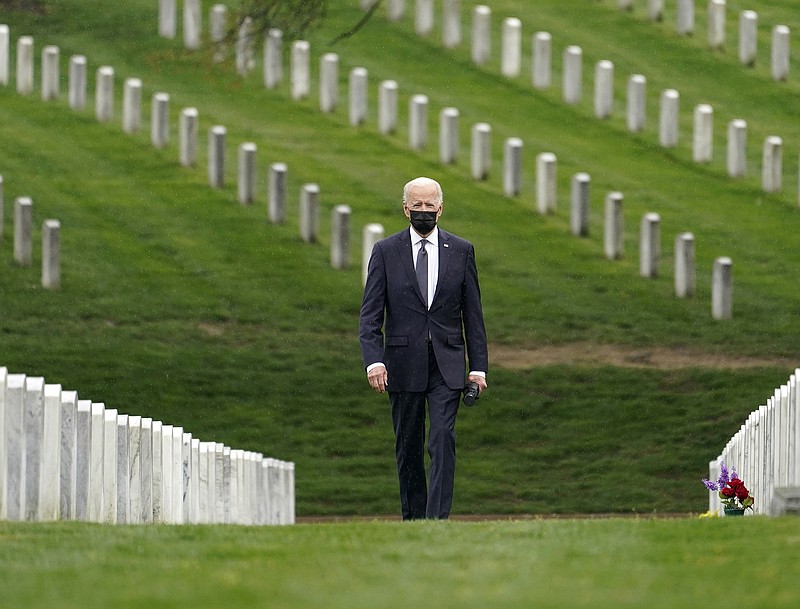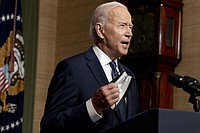WASHINGTON -- President Joe Biden said Wednesday that he will withdraw remaining U.S. troops from the "forever war" in Afghanistan, declaring that the Sept. 11 terror attacks of 20 years ago cannot justify American forces still dying in the nation's longest war.
His plan is to pull out all American forces -- numbering 2,500 now -- by this Sept. 11, the anniversary of the attacks, which were coordinated from Afghanistan. Soon after Biden made his announcement, NATO chief Jens Stoltenberg in Brussels said the alliance had agreed to withdraw its roughly 7,000 troops from Afghanistan, matching Biden's decision to begin a final pullout by May 1.
The U.S. cannot continue to pour resources into an intractable war and expect different results, Biden said.
The drawdown would begin rather than conclude by May 1, which has been the deadline for full withdrawal under a peace agreement the Trump administration reached with the Taliban last year.
"It is time to end America's longest war," Biden said, but he added that the U.S. will "not conduct a hasty rush to the exit."
[Video not showing up above? Click here to watch » https://www.youtube.com/watch?v=fFgmickTRCc]
"We cannot continue the cycle of extending or expanding our military presence in Afghanistan hoping to create the ideal conditions for our withdrawal, expecting a different result," said Biden, who delivered his address from the White House Treaty Room, the same place where President George W. Bush announced the start of the war. "I am now the fourth United States president to preside over an American troop presence in Afghanistan. Two Republicans. Two Democrats. I will not pass this responsibility to a fifth."
Biden's announcement, which he followed with a visit to Arlington National Cemetery, marks a significant foreign policy decision in the early going of his presidency.
He's long been skeptical about the U.S. presence in Afghanistan. As Barack Obama's vice president, Biden was a lonely voice in the administration who advised the 44th president to tilt toward a smaller counterterrorism role in the country while military advisers were urging a troop buildup to counter Taliban gains. Biden also has made clear that he wants to recalibrate U.S. foreign policy to face bigger challenges posed by China and Russia.
Withdrawing all U.S. troops comes with risks. It could boost the Taliban's effort to take back power and undo gains toward democracy and women's rights made over the past two decades. It also opens Biden to criticism, mostly from Republicans and some Democrats, even though former President Donald Trump had also wanted a full withdrawal.
"This administration has decided to abandon U.S. efforts in Afghanistan which have helped keep radical Islamic terrorism in check," said Senate Republican leader Mitch McConnell. "And bizarrely, they have decided to do so by Sept. 11."
While Biden's decision keeps U.S. forces in Afghanistan four months longer than initially planned, it sets a firm end to two decades of war that killed more than 2,200 U.S. troops, wounded 20,000, and cost as much as $1 trillion.
Biden spoke with Afghanistan President Ashraf Ghani on Wednesday ahead of his speech. The White House said in a statement that Biden told Ghani the United States would continue to support the Afghan people through development, humanitarian and security assistance.
"The Islamic Republic of Afghanistan respects the U.S. decision, and we will work with our U.S. partners to ensure a smooth transition," Ghani said in a Twitter posting.
Biden spoke, too, with Bush ahead of announcing his decision. He also spoke with allies, military leaders, lawmakers and Vice President Kamala Harris to help make his decision, according to the White House.
[Gallery not loading above? Click here for more photos » arkansasonline.com/415potus/]
He emphasized that his administration will continue to support peace talks between the Afghan government and the Taliban and assist international efforts to train the Afghan military.
Biden noted that the "forever war" has led to service members who weren't even alive at the time of the Sept. 11 attacks serving, as well as young troops following in the steps of their mothers and fathers in deploying to Afghanistan.
"The war in Afghanistan was never meant to be a multigenerational undertaking," Biden said.
Obama, who had hoped but ultimately failed to end the war during his time in office, said in a statement that he supported Biden's decision, that "it is time to recognize that we have accomplished all that we can militarily, and that it's time to bring our remaining troops home."
After his speech, Biden visited Arlington National Cemetery to honor those who died in recent American conflicts. After paying his respects, Biden told reporters it was "absolutely clear" to him that ending the war was the right decision. Biden, in his speech and during his visit to the hallowed cemetery, reflected on his own late son Beau Biden's service. The president's son, who died of cancer in 2015, had deployed to Iraq with the Delaware Army National Guard.
"I'm always amazed that generation after generation, women and men give their lives to this country," Biden said. "It means I have trouble these days showing up to this cemetery and not thinking about my son."
CIA Director William Burns acknowledged at a hearing Wednesday that America's ability to contain the terrorist threat from Afghanistan has benefited from the military presence there, and that when that presence is withdrawn, "the U.S. government's ability to collect and act on threats will diminish."
"That's simply a fact," Burns said. "It is also a fact, however, that after withdrawal, whenever that time comes, the CIA and all of our partners in the U.S. government will retain a suite of capabilities, some of it remaining in place, some of them that we will generate, that can help us to anticipate and contest any rebuilding effort."
A senior administration official said the September withdrawal date was an absolute deadline that won't be affected by security conditions in Afghanistan.
The long conflict has largely crippled al-Qaida and led to the death of Osama bin Laden, the architect of the Sept. 11 attacks. But an American withdrawal also risks many of the gains made in democracy, women's rights and governance, while ensuring that the Taliban, who provided al-Qaida's haven, remain strong and in control of large swaths of the country.
IN SYNC WITH NATO
As Biden announced his decision, his top national security aides -- Secretary of State Antony Blinken and Defense Secretary Lloyd Austin -- were consulting in Brussels to coordinate NATO's withdrawal from Afghanistan with the planned pullout of American troops.
"Together, we have achieved the goals that we set out to achieve," Blinken told reporters as he met with Stoltenberg at NATO headquarters.
"Now it is time to bring our forces home," he added. "We will work very closely together in the weeks and months ahead on a safe, deliberate and coordinated withdrawal of our forces from Afghanistan."
Even as the Atlantic alliance withdraws its troops, Blinken said, "our commitment to Afghanistan and its future will remain."
Stoltenberg said the alliance's full withdrawal would be completed "in months" but did not mention the 20th anniversary of the Sept. 11 terrorist attacks.
"We went into Afghanistan together, we have adjusted our posture together and we are united in leaving together," he said.
For years, many NATO members, especially Germany, indicated that any withdrawal must be based on the conditions on the ground in Afghanistan. But the Biden administration made clear on Tuesday that this would not be the standard.
"The president has judged that a conditions-based approach, which has been the approach of the past two decades, is a recipe for staying in Afghanistan forever," said a senior U.S. official in remarks to reporters. "He has reached the conclusion that United States will complete its drawdown, will remove its forces from Afghanistan before Sept. 11."
Germany, like other NATO allies, has now accepted the U.S. withdrawal timeline despite some concerns that the exit could lead to the collapse of the U.S.-backed Kabul government and chip away at gains made over the past two decades.
"We have always said we are going in together, and we are going out together," German Defense Minister Annegret Kramp-Karrenbauer told German public broadcaster ARD on Wednesday. "I stand for an orderly withdrawal, and I expect us to decide this today [at NATO]."
NATO allies have been waiting for Biden to decide on a withdrawal deadline and have had consultations with U.S. officials. It was important now, Kramp-Karrenbauer said, "for us in NATO to synchronize our planning with the U.S. planning."
Information for this article was contributed by Aamer Madhani, Matthew Lee, Eric Tucker, Alexandra Jaffe, Zeke Miller and Darlene Superville of The Associated Press; by Steven Erlanger of The New York Times; and by John Hudson of The Washington Post.











